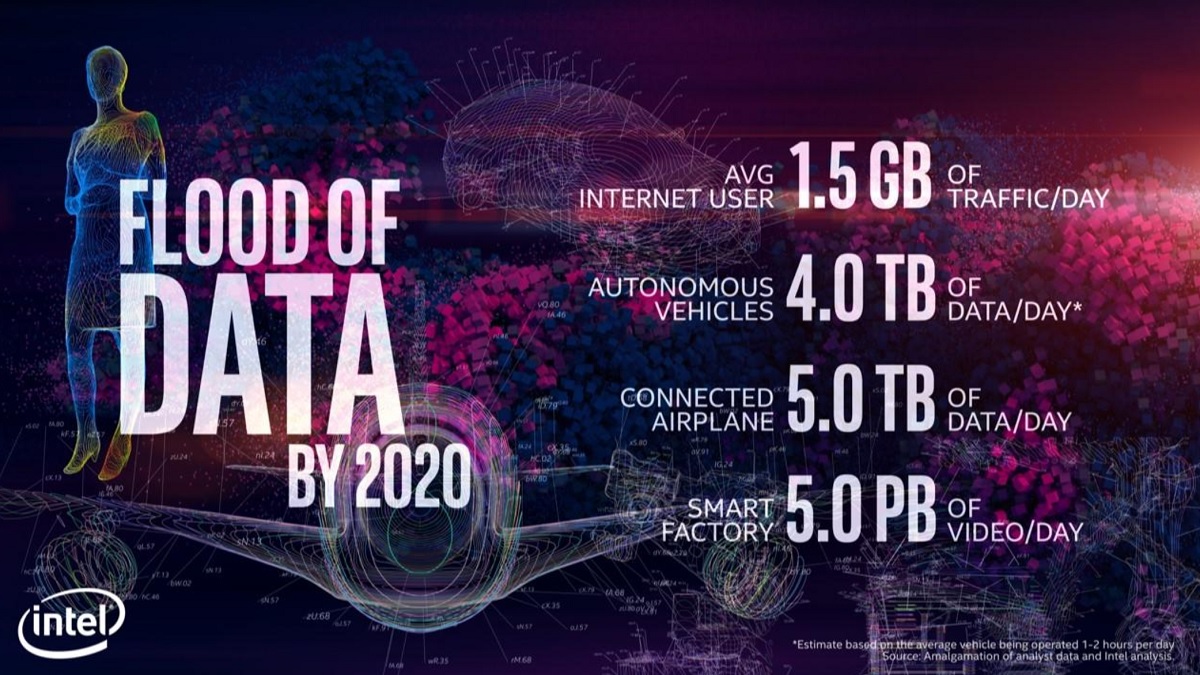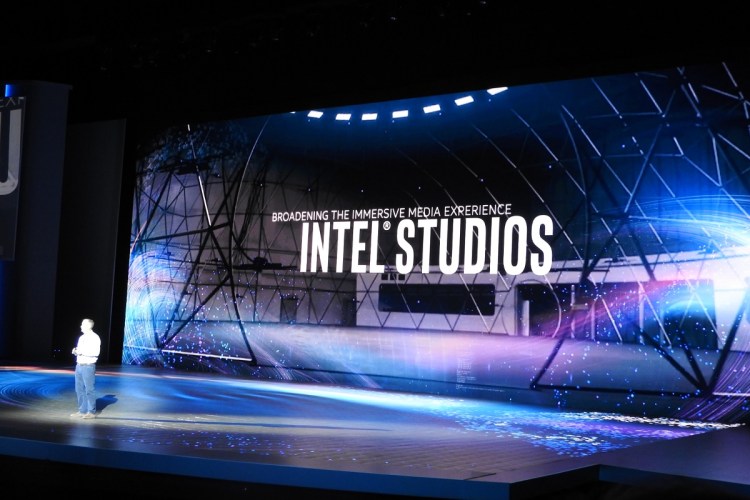In the opening keynote for CES 2018, Intel CEO Brian Krzanich showed off some futuristic tech and announced autonomous driving partnerships with BMW, Nissan, and Volkswagen, and it has another kind of partnership with Ferrari. Krzanich also announced Intel Studios to make immersive media in partnership with Paramount Pictures.
The car partnerships will leverage Intel’s tech for artificial intelligence, including its Mobileye-based mapping technology for helping self-driving cars navigate. Intel also has a new collaboration with SAIC Motor and NavInfo to extend crowdsourced map building to China.
In immersive media, Krzanich said the Intel Studios operation will work with Paramount Pictures to figure out the next generation of visual storytelling through technologies such as virtual reality and non-VR entertainment. Intel Studios will have a huge volumetric video stage and post-production equipment.

Above: Intel’s latest big data stats at CES 2018.
“Data is going to introduce social and economic changes that we see perhaps once or twice in a century,” Krzanich said. “We not only find data everywhere today, but it will be the creative force behind the innovations of the future. Data is going to redefine how we experience life — in our work, in our homes, how we travel, and how we enjoy sports and entertainment.”
June 5th: The AI Audit in NYC
Join us next week in NYC to engage with top executive leaders, delving into strategies for auditing AI models to ensure fairness, optimal performance, and ethical compliance across diverse organizations. Secure your attendance for this exclusive invite-only event.
In autonomous driving, Krzanich announced that 2 million vehicles from BMW, Nissan, and Volkswagen
will use Mobileye Road Experience Management (REM) technology to crowdsource data to build and
rapidly update low-cost, scalable high-definition maps throughout this year.
SAIC will develop Level 3, 4, and 5 cars in China based on Mobileye technology. Levels are assigned based on capacity for autonomy — a Level 4 vehicle can drive itself almost exclusively without any human interaction, and a Level 5 vehicle can drive itself without human interaction on any road.
Krzanich also disclosed details for the company’s new automated driving platform, which combines automotive-grade Intel Atom processors with Mobileye EyeQ5 chips.
He added that Intel will bring AI to the Ferrari Challenge North America Series races that will take place on six courses in the U.S. this year. The Ferrari Challenge broadcast will use Intel chips to transcode, identify objects and events, and stream the experience to viewers online.
Looking ahead to the future of computing, Krzanich noted Intel’s research into neuromorphic computing, a new type of computing architecture that mimics the way brains observe, learn, and understand. Intel’s neuromorphic prototype chip “Loihi” is now fully functioning and will be shared with research partners this year.
Krzanich also announced the next milestone in Intel’s efforts to develop a quantum computing system. Intel shipped its first 49-qubit quantum computing test chip (“Tangle Lake”) to research partner QuTech. Quantum computing is the ultimate in parallel processing, and Krzanich noted it has the potential to compute at a far greater speed than anything ever achieved before.
In sports, Krzanich announced that Intel will enable the largest-scale virtual reality event to date with the
Olympic Winter Games PyeongChang 2018 using Intel True VR technology. Intel, together with the official Rights Holding Broadcasters, will capture a record 30 Olympic events, with both live and video-on-demand content available. This marks the first-ever live virtual reality broadcast of the Olympic Winter Games and will be available in the U.S. via a forthcoming NBC Sports VR app.
Krzanich also showcased how Intel is helping bring the future of 5G to the Olympics Winter Games to enable other new realistic, immersive, and responsive sports and entertainment experiences with VR and 360-degree video.
“We are still discovering new ways to apply the power of AI and data,” Krzanich said. “These discoveries will impact nearly every sector of innovation, and Intel is at the forefront of this revolution, bringing to life the promise of data-driven experiences through autonomous driving, AI, 5G, and VR. At Intel, we not only see a world of infinite possibilities where technology makes our lives easier, we see a future where technology makes the world a better place.”


